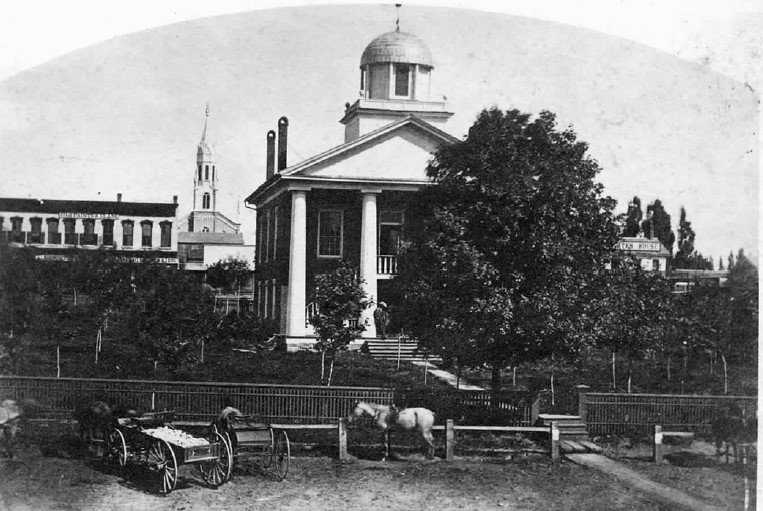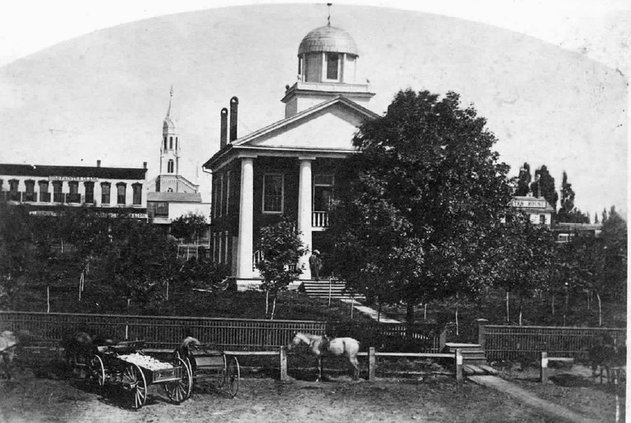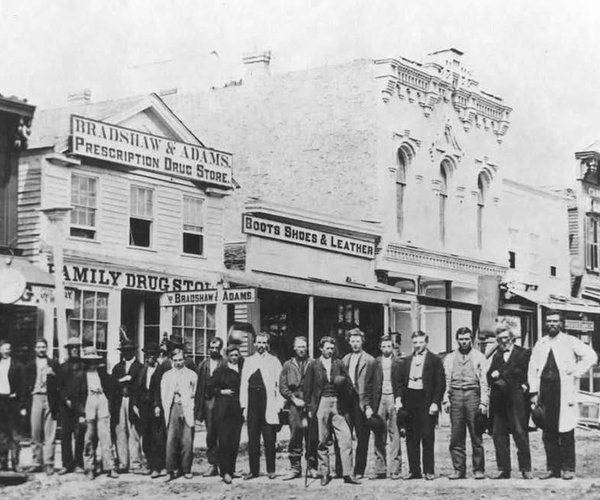Imagine what Monroe was like in the fall of 1865. The Civil War had ended earlier that year. The old Court House was located in the center of the Square, surrounded on all four sides with many wooden buildings separated by a few brick buildings. The population of Monroe would have been about 2,800. At that time Presidents issued Thanksgiving proclamations annually; President Andrew Johnson picked the first Thursday in December in 1865. We will learn today how Monroe celebrated Thanksgiving that year.
An article in the November 29 Monroe Sentinel shared, “While it is right and proper at all times and under all circumstances to publicly acknowledge God’s kind providence over us as a nation, the people of the United States certainly never had greater reason to rejoice, and praise the Father of all our mercies than at the present time. For the salvation of our Union and our Government; for the overthrow of treason and rebellion; for the destruction of human slavery within our boundaries; for the restoration of peace for a bountiful harvest; for political, religious and social privileges; for national honor and prosperity; for all the blessings of life, health and home, we are under obligations to think and praise the Lord of Hosts.”
The editor encouraged people to “lay aside our daily business for one day, and go to the house of worship with glad hearts, thinking of the many mercies with which the path of life has been strewn the past year. We hope the day will be sacredly observed throughout the county; that in every village and neighborhood the people will suspend ordinary business and spend the day in the manner recommended by the Chief Magistrates of our State and Nation.”
Monroe was to observe Thanksgiving in accordance with the “old New England custom.” The businesses, except for hotels and eating houses, were not opened. Everyone was to to attend church. The old folks at home were to invite the children to dine with them. Some households would be rejoicing; in others there would be a vacant chair. All would have reason to “give thanks and sing.” The editor added, “Let all feel as happy as possible, and do what best suits each; but, whether ye fast or feast, ‘praise God from whom all blessings flow.’”
Thanksgiving day was observed in Monroe, strictly in accordance with the program that had been announced the previous week. All business was suspended throughout the day, and the citizens enjoyed themselves in various ways, according to their own inclinations. Religious services were held in the churches in both the morning and the evening with a fair attendance.
Mr. Howe preached at the Universalist Church and Mr. Wilson at the Congregational Church. Mr. Rowley preached in the Methodist Church in the evening. “The sermons were all good, and appropriate to the occasion.
“The weather was very pleasant and many persons improved the day in carriage and horseback riding, hunting, skating, visiting, eating good dinners, &c. The latter occupation was perhaps the ‘chief end of man’ for that particular day.”
The festivities for that holiday ended with a lecture at the Court House and a ball at McKey’s Hall, which sat where the Eugene Hotel now sits.
On October 8 of the following year President Andrew Johnson declared that Thanksgiving would be observed that year on November 29 “in the several States and Territories of the United States.”
However, Thanksgiving day in Monroe was “not generally observed.” Only a few of the business houses were closed and business went on as usual. The Universalist and Methodist churches held services, “but the congregations were rather slim.” At the Methodist Church a collection of $10.75 was taken for the Freedmen’s Aid Commission. “The usual number of good dinners were provided and disposed of, the people generally wore pleasant faces, and seemed to be at peace with themselves and ‘all the rest of mankind.’”
There was a festival at the Universalist Church where a large number of the citizens “partook of a splendid supper prepared by the ladies of that Society. The Monroe Cornet band enlivened the occasion with excellent music, and added much to the enjoyment of the pleasant party assembled there. The dance at the new hall in the evening was largely attended by ‘Young America,’ and others of more mature age.”
It had been shared in the Sentinel a week earlier that “on account of the troubles in Europe, which are not entirely settled, the ‘partition of Turkey’ will be thoroughly discussed, and we hope satisfactorily settled,” by those who attended the festival.
On October 6, 1941, both houses of the United States Congress passed a joint resolution fixing that Thanksgiving would be held on the last Thursday of November beginning in 1942. However, in December of that year the Senate passed an amendment to the resolution that split the difference by requiring that Thanksgiving be observed annually on the fourth Thursday of November, in order to prevent confusion on the occasional years in which November has five Thursdays. The amendment also passed the House, and on December 26, 1941, President Roosevelt signed this bill, for the first time making the date of Thanksgiving a matter of federal law and fixing the day as the fourth Thursday of November.
Now that we know a little more about Thanksgiving than we might have before, I want to wish each of you a very happy Thanksgiving week. May you enjoy family and/or friends or just relax and be thankful for life’s blessings as well as remembering those loved ones who are no longer with us.
— Matt Figi is a Monroe resident and a local historian. His column will appear periodically on Saturdays in the Times. He can be reached at mfigi48@tds.net or at
608-325-6503.



